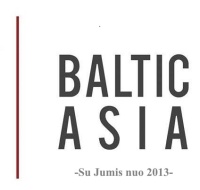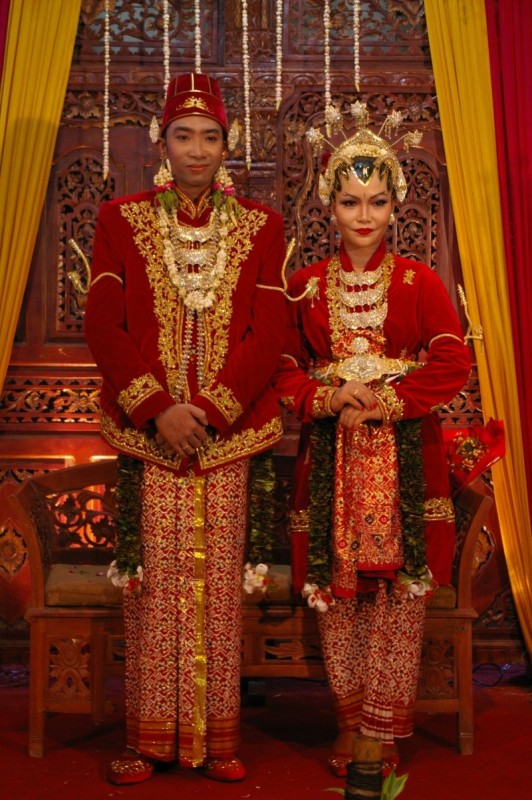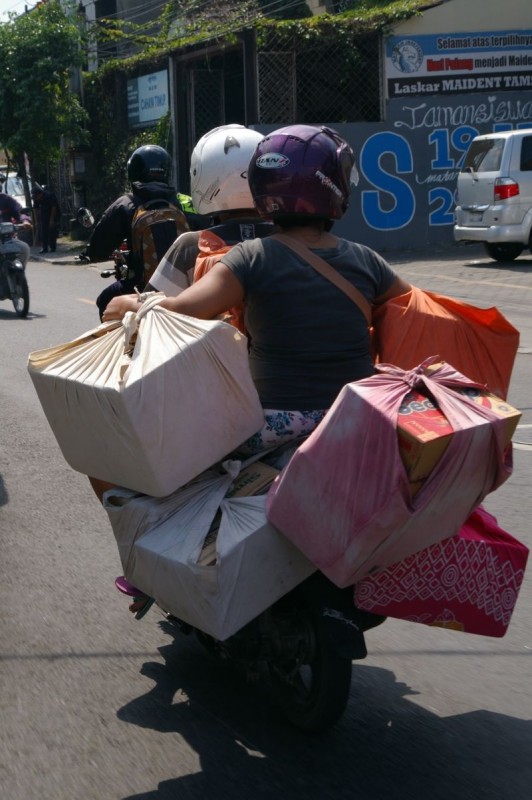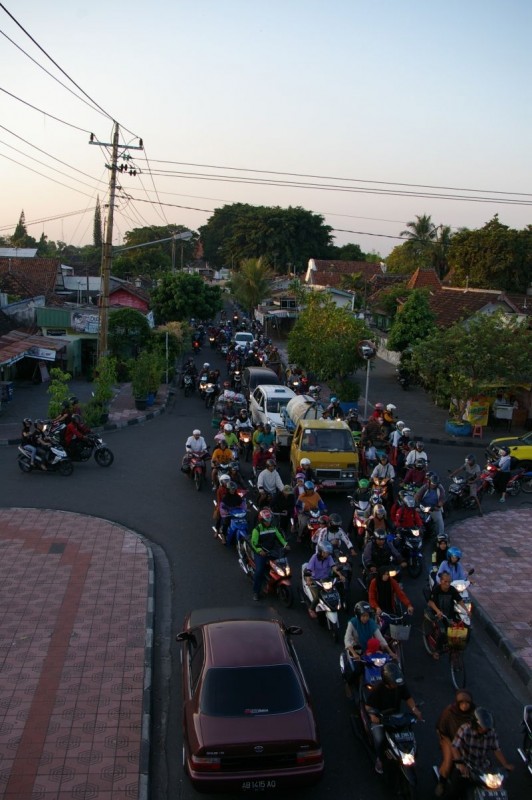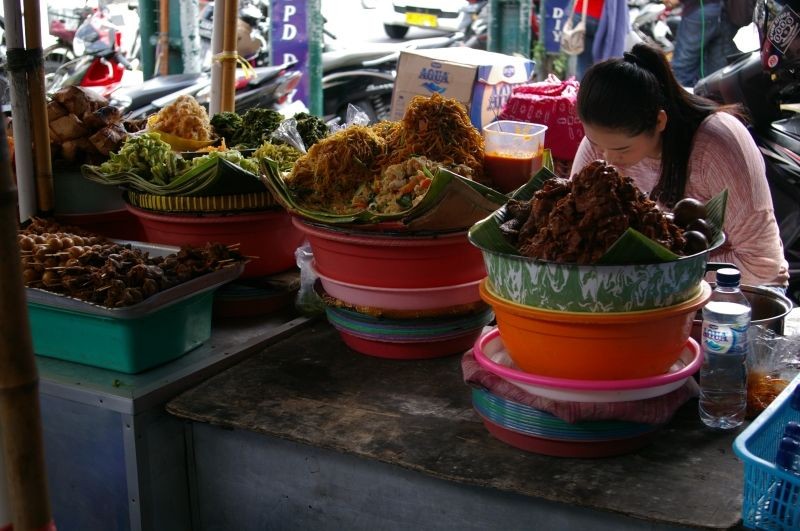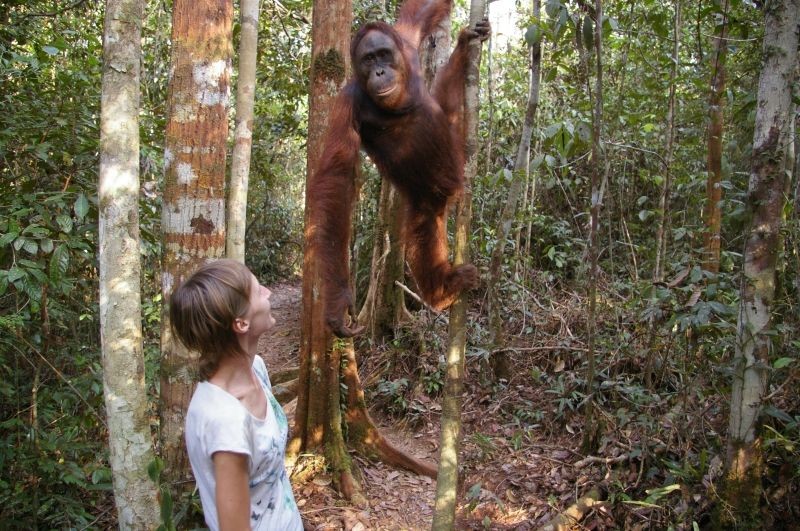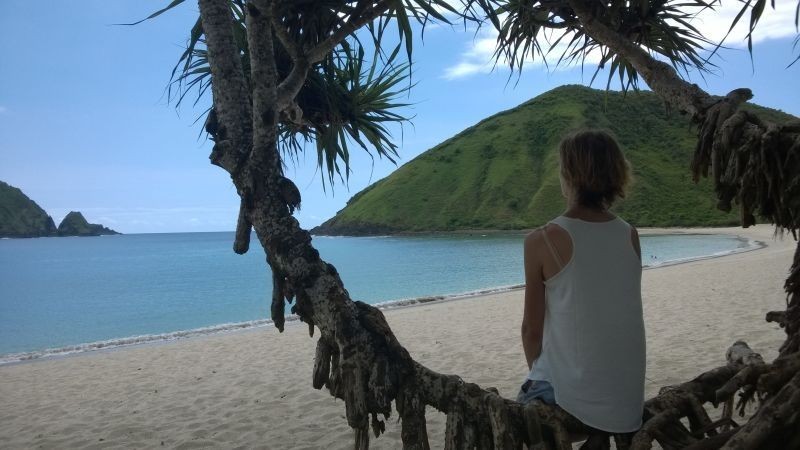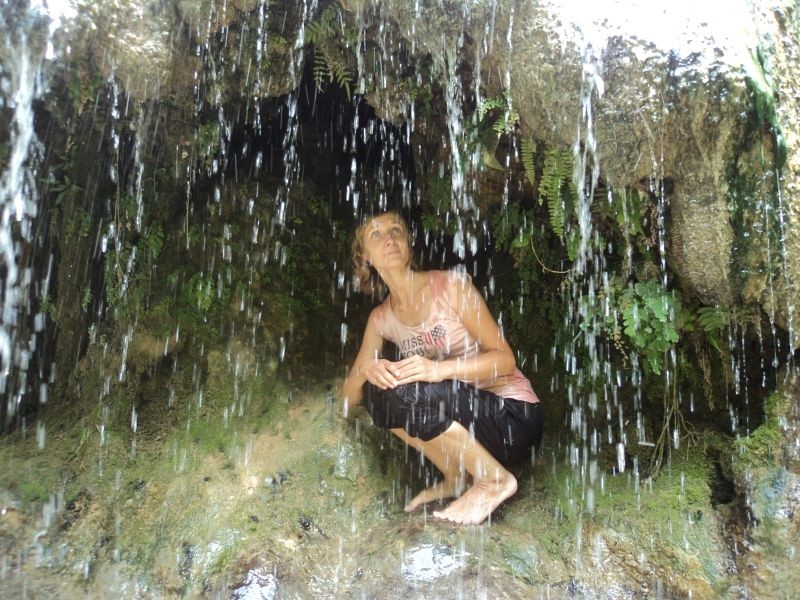Viktorija Panovaite, or Ria, is a Lithuanian who got a Darmasiswa scholarship to study in Indonesia. Having spent over a year in Yogyakarta, she shares her experience about living in Indonesia. Read the first part of Ria’s interview here.
What is your day-to-day life like?
Now that my classes at the university are over, I don’t have a strict schedule. This is something I didn’t get to experience for years, so now I’m enjoying it. I live a pretty relaxed life, getting to know Indonesia. I write my blog & some freelance articles and do whatever fun and exciting comes up, like attending a local festival or a wedding ceremony. Plus I can travel – this is something I didn’t get to do much when I had classes. And when you start traveling, you meet some locals, they recommend that you visit another place you have never heard of, so off you go to plan another trip.
Many foreigners who come to Southeast Asia can’t get over the fear of motorbikes, crazy motorbikers and motorbike taxis. Sounds like it’s not an issue for you since you do drive. Is there anything that scares you?
Honestly, I was very scared of driving a motorbike at first and didn’t even want to learn to do it. When you see how Indonesians drive, it is crazy and you don’t want to be part of that. Most of the locals seem to grow up on a bike, it’s not uncommon to see 7-year old kids driving in villages. So driving fast must be in their blood! But since it’s nearly impossible to live here without a motorbike (you can’t keep asking your friends to drive you places all time time), I had to learn to do it and I did.
It is not uncommon for foreigners to get in accidents here since they are often overconfident and think that if they drove a motorbike in the West, they’ll be fine here. But it’s not true – they don’t know what they’re doing since they don’t understand how Indonesians drive. This is why many of them end up causing accidents. Now I’m quite the opposite – I never go fast and stick to the side of the road, so people can easily pass me. I go on the green light and stop on the red – this isn’t something locals do here.
I drive an automatic motorbike and I’d like to learn with a semi-manual now. Yet, I’m not sure if I’ll be up for that challenge since I had a small accident the first time I rode my motorbike out of the city. I got minor injuries to my feet that time and then had to get over my fear of motorbikes.
Injuries??? So you got to experience Indonesian healthcare system? Did it meet your expectations?
Well, I didn’t have anything serious, but I had to seek medical assistance 4 or 5 times. I didn’t go to big hospitals but went to smaller private clinics whose services are also covered by my insurance. My first impression of these facilities, as well as of many other places in Indonesia, was that there are so many people working there! They fight unemployment by hiring more people for minor tasks. So here’s how it works: you are greeted by one person at the reception, another person gives you your card and then another nurse leads you to see the doctor. Then another nurse will give you a prescription. It takes very long, and in fact these tasks could be done by two people. But this is their way to fight unemployment and help people feed their families, so be it.
When it comes to medical approach, I found that in Lithuania doctors were more likely to run full tests, all those blood tests and so on, but here doctors often don’t find it necessary, which seemed strange to me. The system and the approach is different. There is a variety of hospitals and clinics here, so you really have a choice where to go. I usually go to clinics recommended by my local friends, so I didn’t have any major disappointments.
In our part of the world there are so many stereotypes about Muslim countries; mostly because people don’t know much about them. How comfortable were you coming to Indonesia, a Muslim country you have never been to, and how does it compare with some stereotypes?
I have always tried to avoid stereotypes about other nations and cultures.I believe it is always about a person, and not about nationality, religion and so on. So it was not an issue for me when I was awarded the scholarship. But when my friends and everyone around me started to tell all those scary stories and all this stuff you hear about Muslim countries (not true as I later found out), I was close to getting scared!
But I knew that like everywhere, there are different people and groups, and you cannot blame anything on people because of their religion. It is a big and complicated topic, but I personally have had a great experience in this Muslim country.
Indonesia is a poly-religious country (it also has a large Hindu population, as well as Buddhists and Christians), but Java is the biggest Muslim island. So you naturally see women wearing hijabs, plus Muslim communities have their own rules and customs.
But what truly amazed me was the friendliness and respect people have for each other. Muslim locals will invite you to their traditional feasts and they will have no issues attending your Christmas party, for example. If it’s a holiday for you, they will be happy to celebrate it with you, and you do the same for them. During the month of Ramadan, when some people are fasting during the day, others, either non-fasting Muslims or people of other religions will avoid eating in front of them out of respect. But at the same time no one looks down on those who aren’t fasting.
You don’t see a lot of people hugging or kissing in public – this is not considered appropriate. Sometimes the youngsters do that but it’s not common. People dress more conservatively, so they may sometimes be uncomfortable around foreign tourists who do not wear that much clothing. They probably won’t say it, but this is something that I think tourists should keep in mind – out of respect to the local culture. You don’t have to wear a hijab, but it’s good to make sure that your shorts aren’t extremely short.
Java is a Muslim island while for example Bali is predominantly Hindu, and the Flores island has predominantly Catholic population, but people everywhere are very friendly and respectful of others, which is something I truly admire. And no, none of the stereotypes we hear turned out to be true.
On your blog, you joke that you ‘you know you have lived in Indonesia long enough when you think it’s okay to have noodles for breakfast’. How have your diet and tastes changed since the move?
Oh, they changed a lot! I used to love meat, especially pork, potatoes, pasta and I could eat a lot. Here, everything changed. First of all, there is a lot of rural sights, even here, in Yogyakarta, so you see how all these animals, especially chickens, live here and you stop craving meat so much. I have also stopped eating dairy products, since they are not so common to this area. You cannot find proper cheese, and milk here is so packed with preservatives that it can be kept in the heat unrefrigerated. Definitely it’s not something we’re used to in Lithuania!
I eat mostly natural foods, including rice. Actually, when I moved here, I quickly lost 7 kilos – both because of the change of my diet as well as the rigorous dance training and practices. I did not expect them to be so hard! Overall, my complaint about traditional Indonesian food is that they do not eat many fresh vegetables, like salads the way we’re used to in Europe (if we’re talking about traditional Indonesian food stalls. You can find pretty much every kind of European food in tourist-oriented cafes and restaurants, and prices are great compared to Europe). Also there is a lot of fried food with lots of oil and soya which is something I try to avoid. But I am pretty used to my diet now and eat spicy foods happily, but I’m always happy to receive a package from home, when my Mom sends me some sausage and other familiar Lithuanian stuff.
What is your favorite Asian food/dish?
I like nasi goreng, Indonesian fried rice with chicken. I found a place in Yogyakarta, where a man cooks excellent nasi goreng – the best one I have ever tried. Jakarta is also famous for traditional Indonesian sweets: they produce a lot of candies, cookies, pancakes and so on, and I do have sweet tooth. When you come here, you should try these traditional sweets made from coconut and pandan; they are really something. I also like trying new foods when I travel, especially to Vietnam and Malaysia. Local foods there are delicious!
You seem to take every opportunity to travel. What is your main means to transportation?
I usually try to travel as cheaply as possible, so I use trains and buses. I love traveling by trains because you get to meet lots of local people and learn a lot from them. When I travel with friends, we sometimes go on motorbikes. Motorbikes are great because you can change your plans along the way, plus you can get on a ferry with your bike if you want to visit another island. This way, when you arrive you do not need to rent a bike and can immediately start exploring the new place. For example, you can get to Borneo by ferry, and it takes over 24 hours to reach Borneo from the Java island. It’s very cheap and is a great experience if you have enough time to do it.
Where do you usually stay when you travel?
I have friends from different islands and parts of the country, so I often stay at their homes. Hostels are also a good option, too. I’m also on CouchSurfing, which is great. Not only is it free, but you get to stay with locals, so get to know the people and their ways of life, you see what their homes are like. You cannot get this experience from a hotel! I’ve had mostly great experience with CouchSurfing, except from Singapore, when a guy refused to host me at the very last moment and took me to a hotel instead. My friends and I all noticed that it’s hard to find a CouchSurfing host in Malaysia – for some reason people just don’t want to host you. But overall it’s been a good experience.
Have you ever hosted anyone at your home?
I’d be happy to, but was out of town myself when I got the requests to host. Also my place is a bit far from the downtown, and with no public transportation available, it is not the most convenient place to stay in Yogyakarta.
What are your favorite destinations?
I love to travel around Indonesia, and it seems like the more I travel, the more is there to explore. Indonesian islands are very different, both in terms of nature and landscapes and people. You also get to experience the local life, attend local ceremonies, festivals and this is a truly enriching experience. I can’t think of any other country that would be so beautiful, so colorful and diverse. I understand why so many foreigners decide to stay here! I do plan to travel more across the region, and would love to visit Thailand and Bangkok.
What would you say to some young European who dreams of making a change like you did and exploring Asia? Is this leap worth taking?
This is a very strange and interesting experience, and I fully recommend it! This is something that opens your mind and your heart to the world, and it’s priceless, especially if you have never lived abroad. I understand that for many people making such a move to Asia for a year would be a huge extreme, it’s a very big change and of course you’ll miss your family and friends. So you may want to start with a shorter trip or moving somewhere within Europe, so you are closer to home. What I think is most important is to be open to life, people and new opportunities, and this is what Indonesia has taught me.
All photos are by Viktorija Panovaite, Life in a Big Tent
